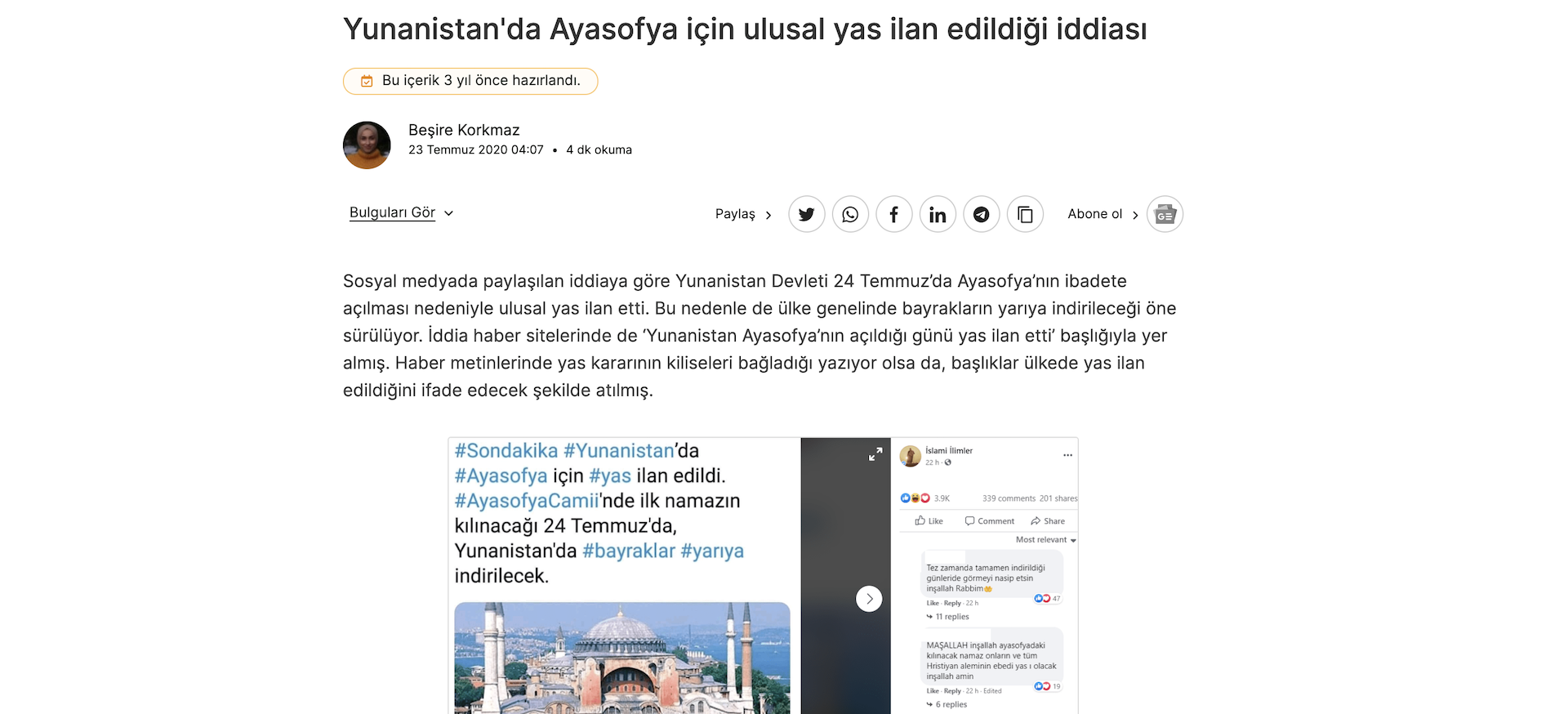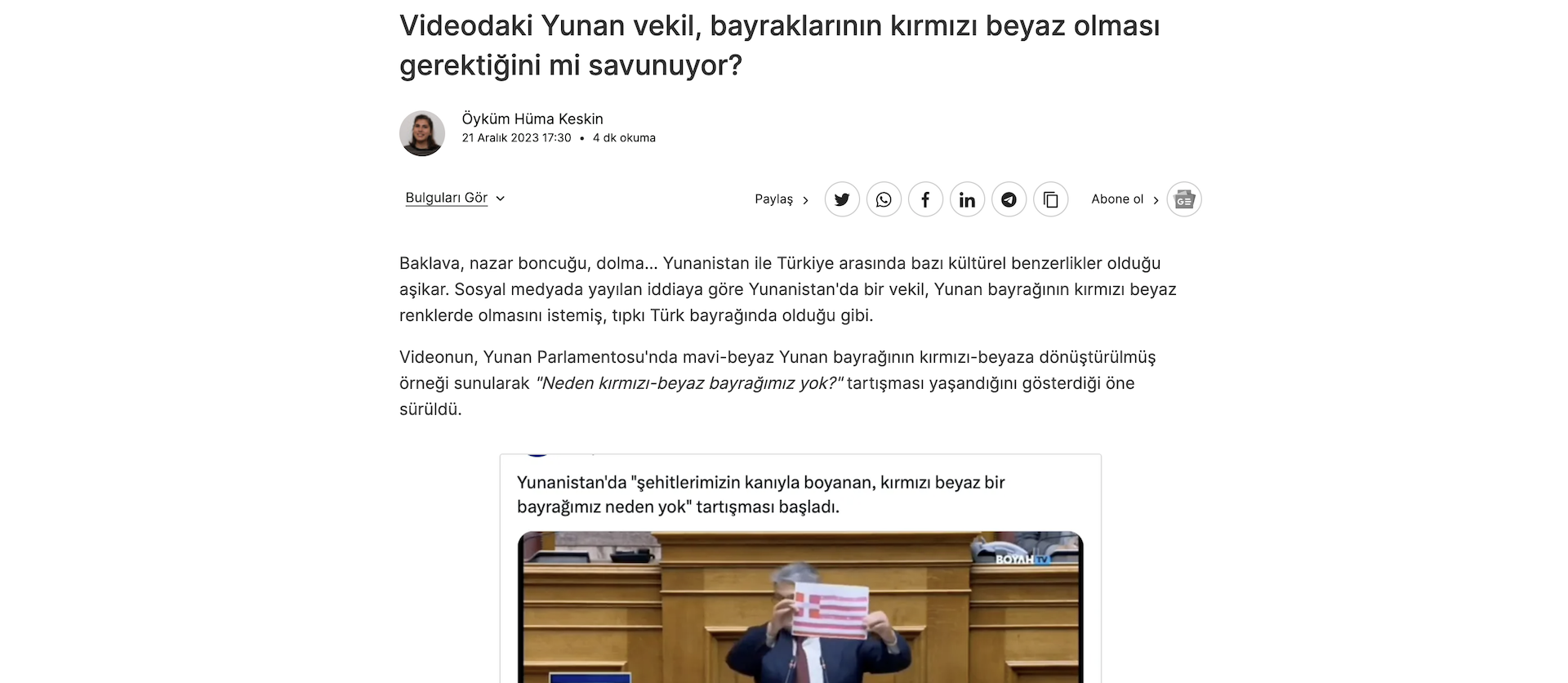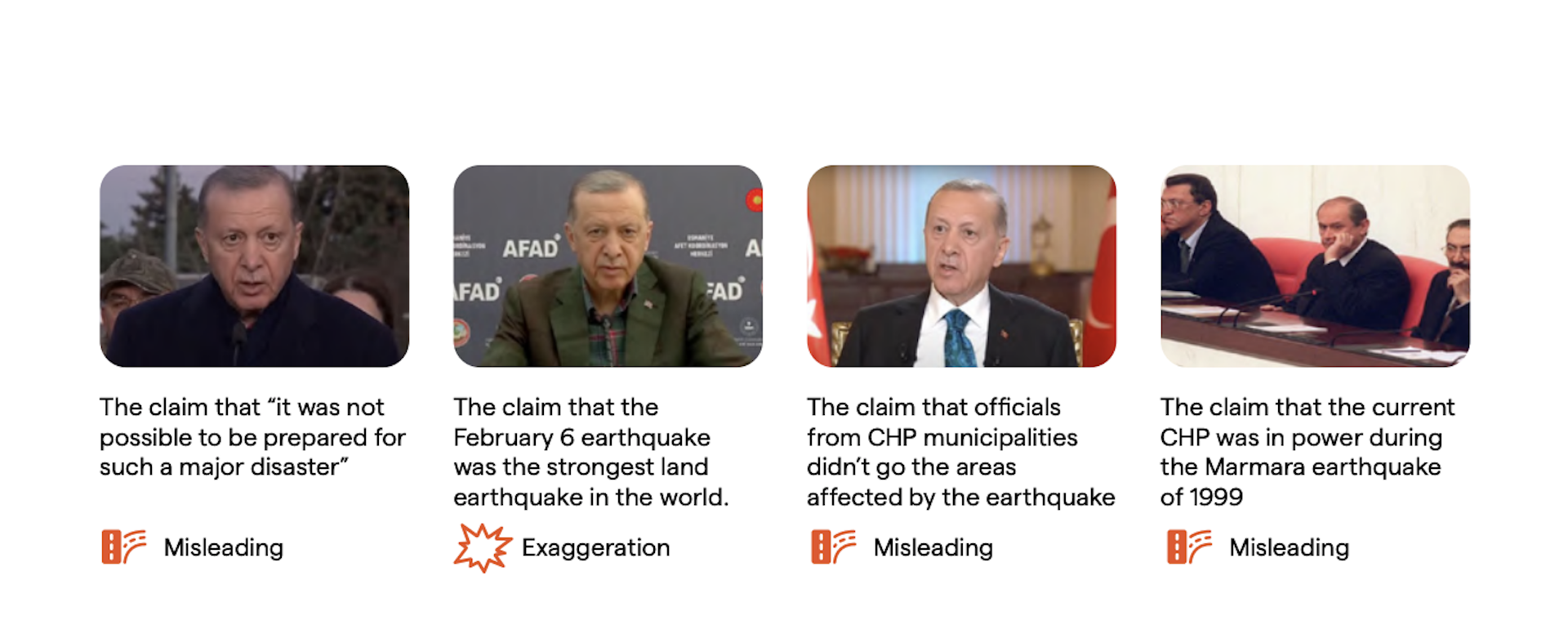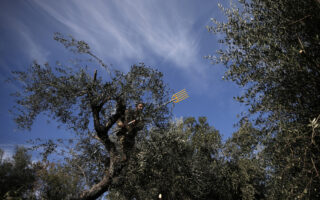The ‘national mourning’ that never was: Combating fake news in Erdogan’s Turkey
Turkish fact-checking platform Teyit’s head of communications talks to Kathimerini about debunking disinformation in periods of crisis

Turkey is definitely not one of those countries that excel as standard-bearers when it comes to balanced reporting and media freedoms or media literacy. On the contrary, it usually appears in the international press for its – many – media deficiencies, whether it be censorship cases, propaganda-induced fake news or media ownership concentration issues.
Still, in such a polarized and politically tense environment, despite the misinformation/disinformation tendencies and the propaganda – or maybe precisely because of them – a team of prolific Turkish fact-checkers has come together. Mahmut Tezcan, Teyit’s head of communications, talked to Kathimerini about debunking fake news in today’s Turkey.
– When did you start with Teyit? What’s the story so far?
Teyit commenced its fact-checking activities in 2016. Over the past seven years, several notable projects and activities have emerged. For instance, in 2017, we published our first activity report, identifying what issues Turkish users were suspicious of online. In the inaugural year, we received around 7,600 reports via direct messages and email, with users mostly flagging politically oriented disinformation.
In 2018, we collaborated with Meta [formerly Facebook] as a third-party fact-checking partner in Turkey to address the issue of misinformation on the platform.
In 2019, during the local elections, we published “The State of Disinformation Disorder” – our first – tracking how disinformation was spreading.
In 2020, we launched our first crowdfunded campaign, “Salgin Var” (There’s an Epidemic), aiming to combat misinformation surrounding modern medicine. We fact-checked best-selling author Soner Yalcin’s book “Kara Kutu,” which sold 300,000 copies in its first edition and contained numerous claims and conspiracy theories against modern medicine. Again, in the same year, we sent out a weekly newsletter, “Covid-19 Postasi,” to 12,000 subscribers to prevent misinformation about the pandemic and promote accurate information dissemination at the beginning of the Covid-19 epidemic.
In 2021, through our partnership with the Teacher Network, Turkey’s most influential teacher community, we conducted the “Digital Media Literacy with Teachers” project, aiming to enhance critical media literacy among teachers and students. Also, we began combating misinformation on TikTok as a third-party verification partner in Turkey.
Leading up to the 2023 presidential and parliamentary elections, we initiated projects such as “Statement Check,” analyzing politicians’ statements, and “Promise Check,” analyzing the government’s past promises. We also published the second edition of “The State of Disinformation Disorder 2023,” examining 201 claims and disinformation patterns related to the same elections.
To reach wider audiences, we launched our online learning platform, “Purmerak Club,” which offers detailed courses and long reads on fact-checking, along with modules aimed at increasing critical digital media literacy.
Over the past seven years, Teyit has become a leading media company in preventing and debunking misinformation, especially during times of crisis such as elections, wars, earthquakes, wildfires. We continue to raise awareness about media literacy among broad audiences through our community, with the majority of feedback being positive and constructive criticism.

– Turkey gets very low ratings when it comes to media/press freedom. Is this because of fake news or other factors as well?
While misleading information certainly has a place in the history of Turkish media, it’s not necessarily a primary factor in the decline of press freedom. The fundamental reasons for the decrease in press freedom can be summarized within a historical context, including government-media relations, media ownership structures, and laws and practices that threaten press freedom.
– Was it ever a concern to you that you might be targeted or prosecuted because of what you do? Do you feel safe?
As Turkey’s leading fact-checking platform, we adhere to a methodology that prioritizes transparency and impartiality, aiming to address critical issues and uncover the truth. Readers can access our methodology and see clearly how and what we analyze in our detailed analyses. While we may face backlash from different societal and political sectors due to the topics we address, we have not encountered any serious legal repercussions.
– When it comes to fake news in Turkey, are there areas of interest that attract/generate more of it than others? Are foreign policy and relations with Greece a field that plays into the hands of those who disseminate fake news?
The landscape of misinformation varies over time, often aligning with the political agenda. In recent times, refugees and LGBTQ+ groups have become targets of disinformation. The production of false information can fluctuate depending on the diplomatic relations between Turkey and Greece, ranging from periods of rapprochement to escalation. For instance, in 2020, when Ayasofya [Hagia Sophia] was reconverted into a mosque, we analyzed claims suggesting that Greece had declared a national day of mourning and lowered its flags halfway in response.
– Do you feel that debunking fake news could also lead to an improvement in relations with neighboring countries?
In polarized societies, particularly misleading information related to politics can exacerbate polarization and distance societies from peaceful coexistence. We can apply the impact of misinformation to international relations as well. Correcting false information or news about the relationship between two countries can lead to calmer and more peaceful perceptions between societies. However, the most crucial factor here is the magnitude of the influence wielded by the disseminator of information. Politicians also have a significant role to play in ensuring that international relations are based on truth.
– Would you describe the fake information you debunk as sophisticated? Do you come across deepfakes as well?
Sometimes, I can say we encounter more sophisticated disinformation. However, especially during crisis periods, we observe that hastily fabricated falsehoods spread more quickly. During events such as elections or earthquakes, what we refer to as “cheap fakes” – quickly created or inaccurately associated images – tend to spread more widely than deepfakes.

– What’s your opinion/overview of the Turkish media/press/news environment? Aside from all the negatives, do you see any positives?
Certainly, we can discuss several positive aspects. There are numerous individuals working towards a journalism that is more refined, better, stronger and sustainable. Thanks to new media practices, many media platforms that have emerged alongside the internet are producing significant content in various fields. Additionally, we see that the newsrooms we engage with are very eager to spread the truth and incorporate fact-checking and verification practices to combat misinformation.
– Future plans/projects?
While the upcoming local elections on March 31 currently dominate our focus, following the elections, we will begin publishing our “Greenwashing Watch” and “Urban Legends” projects. In each of our projects, we prioritize our mission to debunk and combat the spread of dis/misinformation. We aim to further strengthen and expand our community by promoting our online learning platform, Purmerak Club. Additionally, we will continue our efforts to maintain communication and solidarity with newsrooms in the media ecosystem to help journalists acquire current fact-checking practices as part of their fight against disinformation.
– How are things financially? Can projects as Teyit survive economically?
Teyit is a platform powered by its community, having successfully implemented various crowdfunding projects in the past. Economically, in addition to our third-party fact-checking partnerships with Facebook and TikTok, we support our business model by applying for funding through projects we produce. We also plan to soft-launch new revenue and business models in 2024 that we have been working on over the past year.






